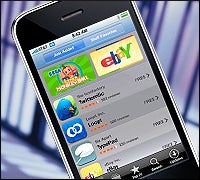 |
Several upstarts are challenging Apple’s wildly successful App Store as the preferred online storefront for iPhone software. But they may be playing with fire, experts warn.
Apple (NASDAQ: AAPL) tightly controls what software can be distributed, whether free or paid, on the App Store. The alternatives, like the Cydia Store, offer applications that, for a variety of reasons, Apple has refused. Like the App Store, Cydia is an iPhone application that its creator said is used by over a million iPhone users every week.
But the Cydia Store requires the iPhone to be modified — or “jailbroken” — to run unauthorized programs, though Apple has historically frowned on the process, with some jailbroken iPhones suffering deactivation during later software updates from Apple.
Jay Freeman, who started Cydia, said it’s worth it. “You want to jailbreak for the flexibility and the additional applications you can get,” he told InternetNews.com.
While Apple’s App Store continues ballooning in popularity — the company has said there are now over 22,000 iPhone applications available through its store, which has processed over 500 million downloads so far — Cydia’s not the only competitor looking to take it on. According to a report in the Wall Street Journal, another alternative called “Rock Your Phone” is for iPhone users who have not yet modified their iPhone to make it easier to download and buy unauthorized applications.
Birth of an App Store competitor
To Freeman, iPhone users need an alternative to the Apple App Store that allow them to sidestep the company’s strict policies covering the kinds of apps it will allow. But Apple has maintained that it works to ensure apps meet a high level of quality, singling out malware, pornography and “bandwidth hogs” in particular.
But it’s also raised the ire of some developers for banning applications that seemed to compete with its own offerings — or for reasons developers say they’ve never been fully explained.
Apple did not return a call for comment by press time.
Freeman himself said he’s spent hundreds of dollars on applications at the App Store, but he grew frustrated with Apple’s refusal to accept certain apps — including his own Cycorder video-recording program. So he launched the Cydia Store, which offers Cycorder and a raft of other programs from other developers not available from the App Store.
These include streaming video applications, another that will let you run the iPhone from a notebook computer, and a call-blocking program.
Buyer beware?
Industry analyst Jack Gold agreed that Apple’s control of the App Store is too stringent and that’s why Cydia and others will flourish — if briefly.
[cob:Special_Report]”Apple can shut [Cydia] down in a matter of days,” said Gold, who heads J. Gold & Associates. “They can sue him for breaking copyrights or send updated iPhone software that will shut him off.”
But Gold added that Apple shouldn’t have a monopoly on the distribution of iPhone software.
“Absolutely not. Can you imagine if Microsoft said you could only get Windows Mobile applications from Microsoft, or Nokia or [Research in Motion] did something similar?” he said. “There’d be a huge outcry, but somehow Apple gets away with it.”
Page 2: Rise of the rivals
Page 2 of 2
Gold acknowledged Apple’s argument that it should be allowed a certain level of control over software for security purposes. But he noted Apple’s occasional banning of other programs simply because they compete with Apple’s own software — one case being the Opera Web browser.
“That’s not the way efficient markets work,” Gold said. “It’s not right and it really does stifle innovation.”
iPhone developer Tony Bove said he wouldn’t use a jailbroken iPhone for ethical reasons, but said Apple might actually might benefit from Cydia and others.
“A lot of time innovation pops out of these efforts,” he said. “At the very least, Apple might learn something about its security.”
But he thinks users are taking a risk that might not be worth it. “You take an application like video recording. Apple is definitely going to make use of the iPhone’s camera for video conferencing and these other apps probably won’t even work when Apple decides to release their own.”
Rise of the rivals
But so far, Freeman’s efforts are paying off. He said he can barely keep up with developer and consumer interest as he looks to outsource some of the support and possibly add staff to his one-person operation.
He’s also running Cydia while continuing his studies as graduate student at the University of California, Santa Barbara.
Freeman admitted that the Apple App Store is easier to use than his rival. But he’s in the process of simplifying Cydia with changes he expects to go live later tonight. Currently, a user has to first go to an application’s individual software provider to pay a program featured on Cydia, but Freeman said he’s about to enable an Amazon-powered payment system that will bring Cydia more in line with the simplicity of the App Store.
Still, Freeman said Apple could cut off at least half his business if it just “wasn’t so stubborn.”
One example stems from his earlier, thwarted efforts to gain traction with Winterboard,
a free program he wrote that lets iPhone users change any graphics or wallpaper on the device.
[cob:Special_Report]Freeman said it’s become the most popular application he’s offered through Cydia because iPhone users want to be able to customize the look of the device with sports themes and other graphics. It also sparks interest in other Cydia apps.
“If Apple allowed people to have their own wallpaper and allowed video recording apps, it would cut 50 percent into my market,” he said. “But people see those things at Cydia and they stay and look for more.”


